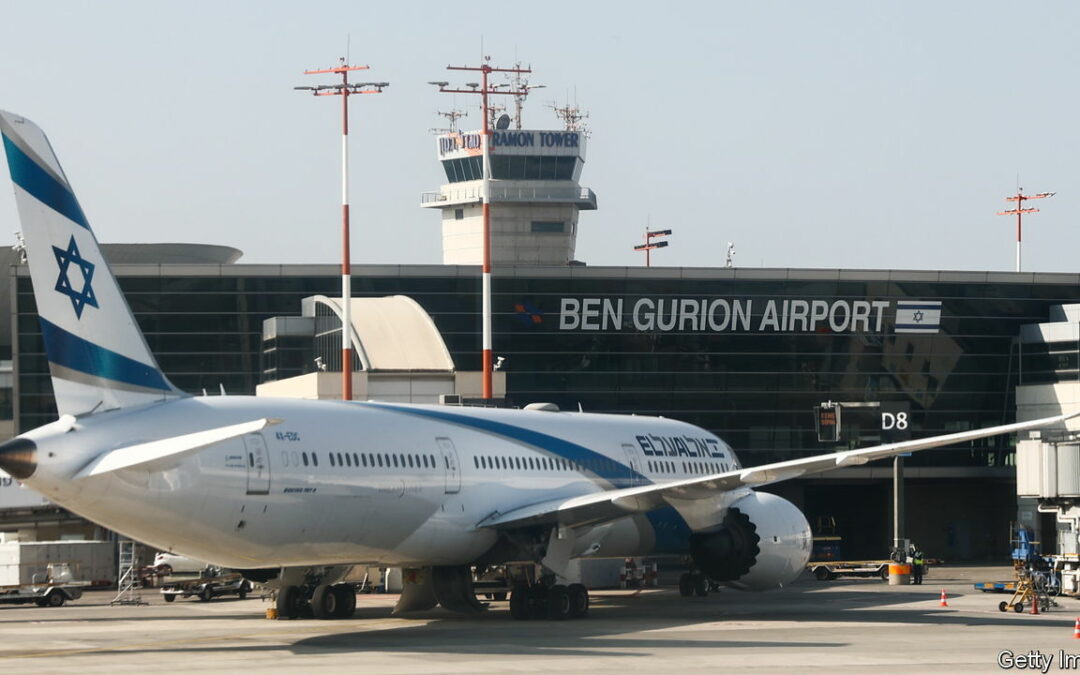SINCE THE bloody attack on Israel on October 7th, roughly 90% of airlines flying to Israel, including British Airways and Emirates, have suspended flights to the country. Hamas, the militant group that runs the Gaza Strip, has repeatedly fired rockets at Ben-Gurion airport, Israel’s largest, near Tel Aviv. On October 9th one landed nearby, sending travellers scrambling for cover. Yet Israeli airports, including Ben-Gurion, continue to operate. Why and how have they stayed open?
Israel needs its airports, particularly now. In preparation for a ground offensive in Gaza it has called up army reservists, some of whom were abroad. Airlines are also ferrying in diplomats and negotiators. A high proportion of Israel’s cargo, from hospital equipment to supplies for the war effort, arrives by air. Stopping flights would dent morale and represent an apparent capitulation to Hamas. During a conflict in 2014 America’s Federal Aviation Administration suspended flights to Ben-Gurion, a decision condemned by many politicians in America and Israel. The order was rescinded within 36 hours. Grounding civilian flights, says an Israeli aviation official, would be like “closing our only oxygen line”.
Yet the threat of strikes on aircraft is real. Hamas recently unveiled its first locally produced anti-aircraft missile, Mutabar-1. It is not yet viable against commercial flights, given that its range is probably 8km or less. But the group’s ground-attack rockets fly further. Since 2011, Israel has been protected from most of them by Iron Dome, its missile-interceptor system. But in that period, the range of Hamas rockets has increased from roughly 20km to 170km, says Yossi Kuperwasser, a retired brigadier-general and former director-general of Israel’s Ministry of Strategic Affairs, putting airports in range. In the past, to conserve pricey interceptors, rockets that were expected to land in unpopulated areas were not usually shot down. Now, says Mr Kuperwasser, if an airport is nearby, interceptors are launched to limit panic among travellers.
Before the recent conflict, civilian aircraft had already kept at least 80km from Gaza. Airlines have adjusted their routes further in recent days. Flights from America and Europe bound for Ben-Gurion now take a northerly route, entering Israeli airspace just south of Haifa before banking southwest to reach the airport from the north, says Gideon Mendelson of the Israeli Air Line Pilots Association. This reduces the number of planes over heavily populated areas where rockets are most likely to fly.
In recent years Israel has increased the integration of its civilian and military air-traffic control, with controllers in the same operations rooms using shared radar screens. Staff now have more warning before a potential strike on an airliner, usually at least 90 seconds. That is enough to give pilots “a calm, simple instruction” for an evasive manoeuvre, says the aviation official. The new flight routes also give pilots more time to direct their aircraft away from approaching rockets.
To increase safety, Israel’s Civil Aviation Authority has told airlines to carry more fuel. Some Ben-Gurion-bound planes have been put in holding patterns for almost 50 minutes due to rocket fire. The extra fuel has prevented the need for emergency landings at other airports. The time airliners spend at Israeli airports has also been shortened, often from 90 minutes or so to less than an hour, by speeding up cleaning and refuelling. All flights to and from Ben-Gurion have been moved to the airport’s newest terminal, which has more bomb shelters and was built to better withstand rocket strikes.
The weeks ahead will be trying. Israeli airlines and some foreign carriers, including Etihad, the United Arab Emirates’ flag carrier, and Air Serbia are still operating flights to the country. But most airlines that suspended flights after October 7th are yet to resume them. In recent days some flights to Beirut, Lebanon’s capital, have been cancelled due to shelling between Israel and Hizbullah, in southern Lebanon. If the Iran-backed militia is drawn into the fighting on a large scale, the danger will increase. The group’s leader, Hassan Nasrallah, has hundreds, if not thousands of rockets that can hit Ben-Gurion. ■









